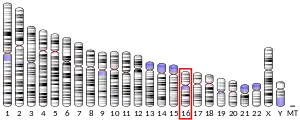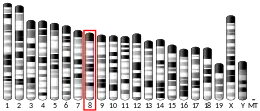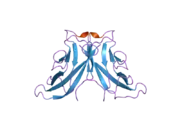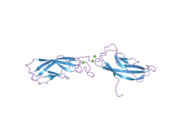Cadherin-11 is a protein that in humans is encoded by the CDH11 gene.[5][6]
Function
This gene encodes a type II classical cadherin from the cadherin superfamily, integral membrane proteins that mediate calcium-dependent cell-cell adhesion. Mature cadherin proteins are composed of a large N-terminal extracellular domain, a single membrane-spanning domain, and a small, highly conserved C-terminal cytoplasmic domain. Type II (atypical) cadherins are defined based on their lack of a HAV cell adhesion recognition sequence specific to type I cadherins. Expression of this particular cadherin in osteoblastic cell lines, and its upregulation during differentiation, suggests a specific function in bone development and maintenance.[6] The mammalian CDH-11 homologues are termed calsyntenin.[7]
Relevance to cancer
CDH11 is overexpressed in 15% of breast cancers and seems essential to tumour progression in some other cancer types.[8][9]
Drug interactions
Interactions
References
- 1 2 3 GRCh38: Ensembl release 89: ENSG00000140937 - Ensembl, May 2017
- 1 2 3 GRCm38: Ensembl release 89: ENSMUSG00000031673 - Ensembl, May 2017
- ↑ "Human PubMed Reference:". National Center for Biotechnology Information, U.S. National Library of Medicine.
- ↑ "Mouse PubMed Reference:". National Center for Biotechnology Information, U.S. National Library of Medicine.
- ↑ Kremmidiotis G, Baker E, Crawford J, Eyre HJ, Nahmias J, Callen DF (Aug 1998). "Localization of human cadherin genes to chromosome regions exhibiting cancer-related loss of heterozygosity". Genomics. 49 (3): 467–71. doi:10.1006/geno.1998.5281. PMID 9615235.
- 1 2 "Entrez Gene: CDH11 cadherin 11, type 2, OB-cadherin (osteoblast)".
- ↑ Vogt L, Schrimpf SP, Meskenaite V, Frischknecht R, Kinter J, Leone DP, Ziegler U, Sonderegger P (2001). "Calsyntenin-1, a proteolytically processed postsynaptic membrane protein with a cytoplasmic calcium-binding domain". Mol. Cell. Neurosci. 17 (1): 151–66. doi:10.1006/mcne.2000.0937. PMID 11161476. S2CID 30856590.
- 1 2 "New Therapeutic Approach Could Target Both Cancer and Arthritis". 15 Nov 2013.
- 1 2 Assefnia S, Dakshanamurthy S, Guidry Auvil JM, Hampel C, Anastasiadis PZ, Kallakury B, Uren A, Foley DW, Brown ML, Shapiro L, Brenner M, Haigh D, Byers SW (Mar 2014). "Cadherin-11 in poor prognosis malignancies and rheumatoid arthritis: common target, common therapies". Oncotarget. 5 (6): 1458–74. doi:10.18632/oncotarget.1538. PMC 4039224. PMID 24681547.
- ↑ Straub BK, Boda J, Kuhn C, Schnoelzer M, Korf U, Kempf T, Spring H, Hatzfeld M, Franke WW (Dec 2003). "A novel cell-cell junction system: the cortex adhaerens mosaic of lens fiber cells". J. Cell Sci. 116 (Pt 24): 4985–95. doi:10.1242/jcs.00815. PMID 14625392.
Further reading
- Suzuki S, Sano K, Tanihara H (1991). "Diversity of the cadherin family: evidence for eight new cadherins in nervous tissue". Cell Regul. 2 (4): 261–70. doi:10.1091/mbc.2.4.261. PMC 361775. PMID 2059658.
- Tanihara H, Sano K, Heimark RL, St John T, Suzuki S (1995). "Cloning of five human cadherins clarifies characteristic features of cadherin extracellular domain and provides further evidence for two structurally different types of cadherin". Cell Adhes. Commun. 2 (1): 15–26. doi:10.3109/15419069409014199. PMID 7982033.
- Okazaki M, Takeshita S, Kawai S, Kikuno R, Tsujimura A, Kudo A, Amann E (1994). "Molecular cloning and characterization of OB-cadherin, a new member of cadherin family expressed in osteoblasts". J. Biol. Chem. 269 (16): 12092–8. doi:10.1016/S0021-9258(17)32685-6. PMID 8163513.
- Getsios S, Chen GT, Stephenson MD, Leclerc P, Blaschuk OW, MacCalman CD (1998). "Regulated expression of cadherin-6 and cadherin-11 in the glandular epithelial and stromal cells of the human endometrium". Dev. Dyn. 211 (3): 238–47. doi:10.1002/(SICI)1097-0177(199803)211:3<238::AID-AJA5>3.0.CO;2-I. PMID 9520111. S2CID 43022919.
- Pishvaian MJ, Feltes CM, Thompson P, Bussemakers MJ, Schalken JA, Byers SW (1999). "Cadherin-11 is expressed in invasive breast cancer cell lines". Cancer Res. 59 (4): 947–52. PMID 10029089.
- Kawaguchi J, Takeshita S, Kashima T, Imai T, Machinami R, Kudo A (1999). "Expression and function of the splice variant of the human cadherin-11 gene in subordination to intact cadherin-11". J. Bone Miner. Res. 14 (5): 764–75. doi:10.1359/jbmr.1999.14.5.764. PMID 10320525. S2CID 12829659.
- Braungart E, Schumacher C, Hartmann E, Nekarda H, Becker KF, Höfler H, Atkinson MJ (2000). "Functional loss of E-cadherin and cadherin-11 alleles on chromosome 16q22 in colonic cancer". J. Pathol. 187 (5): 530–4. doi:10.1002/(SICI)1096-9896(199904)187:5<530::AID-PATH293>3.0.CO;2-C. PMID 10398117. S2CID 22384331.
- Kashima T, Kawaguchi J, Takeshita S, Kuroda M, Takanashi M, Horiuchi H, Imamura T, Ishikawa Y, Ishida T, Mori S, Machinami R, Kudo A (1999). "Anomalous cadherin expression in osteosarcoma. Possible relationships to metastasis and morphogenesis". Am. J. Pathol. 155 (5): 1549–55. doi:10.1016/S0002-9440(10)65471-5. PMC 1866957. PMID 10550312.
- Lecanda F, Cheng SL, Shin CS, Davidson MK, Warlow P, Avioli LV, Civitelli R (2000). "Differential regulation of cadherins by dexamethasone in human osteoblastic cells". J. Cell. Biochem. 77 (3): 499–506. doi:10.1002/(SICI)1097-4644(20000601)77:3<499::AID-JCB14>3.0.CO;2-0. PMID 10760957. S2CID 13331343.
- Braungart E, Hartman E, Bechler K, Höfler H, Atkinson MJ (2002). "The intracellular domain of cadherin-11 is not required for the induction of cell aggregation, adhesion or gap-junction formation". Cell Commun. Adhes. 8 (1): 15–27. doi:10.3109/15419060109080704. PMID 11775026. S2CID 23322445.
- Straub BK, Boda J, Kuhn C, Schnoelzer M, Korf U, Kempf T, Spring H, Hatzfeld M, Franke WW (2004). "A novel cell-cell junction system: the cortex adhaerens mosaic of lens fiber cells". J. Cell Sci. 116 (Pt 24): 4985–95. doi:10.1242/jcs.00815. PMID 14625392.
- Morimoto AM, Tan N, West K, McArthur G, Toner GC, Manning WC, Smolich BD, Cherrington JM (2004). "Gene expression profiling of human colon xenograft tumors following treatment with SU11248, a multitargeted tyrosine kinase inhibitor". Oncogene. 23 (8): 1618–26. doi:10.1038/sj.onc.1207268. PMID 14985702. S2CID 23251484.
- Marchong MN, Chen D, Corson TW, Lee C, Harmandayan M, Bowles E, Chen N, Gallie BL (2005). "Minimal 16q genomic loss implicates cadherin-11 in retinoblastoma". Mol. Cancer Res. 2 (9): 495–503. doi:10.1158/1541-7786.495.2.9. PMID 15383628. S2CID 24674595.
- Oliveira AM, Perez-Atayde AR, Inwards CY, Medeiros F, Derr V, Hsi BL, Gebhardt MC, Rosenberg AE, Fletcher JA (2004). "USP6 and CDH11 oncogenes identify the neoplastic cell in primary aneurysmal bone cysts and are absent in so-called secondary aneurysmal bone cysts". Am. J. Pathol. 165 (5): 1773–80. doi:10.1016/S0002-9440(10)63432-3. PMC 3278819. PMID 15509545.
- Kiener HP, Brenner MB (2005). "Building the synovium: cadherin-11 mediates fibroblast-like synoviocyte cell-to-cell adhesion". Arthritis Research & Therapy. 7 (2): 49–54. doi:10.1186/ar1495. PMC 1065331. PMID 15743489.
- Kiener HP, Lee DM, Agarwal SK, Brenner MB (2006). "Cadherin-11 induces rheumatoid arthritis fibroblast-like synoviocytes to form lining layers in vitro". Am. J. Pathol. 168 (5): 1486–99. doi:10.2353/ajpath.2006.050999. PMC 1606584. PMID 16651616.
External links
- CDH11 human gene location in the UCSC Genome Browser.
- CDH11 human gene details in the UCSC Genome Browser.








